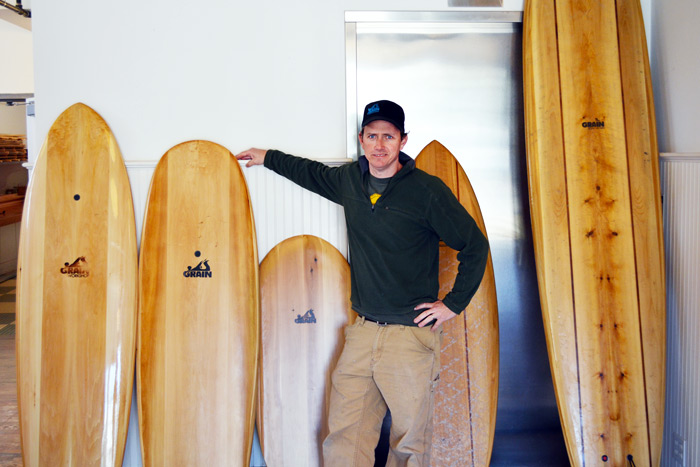Grain Surfboards Opens Hamptons Outpost

Against the back wall at Grain Surfboards are five boards in differing sizes and shapes, some in the late stages of completion—all displaying the company’s signature wood grain design. The smell of wood permeates the room, and so it should. Wood, after all, is what Grain is all about.
Navigating the slightly cluttered space, Brian Schopfer—co-proprietor of Grain with his brother-in-law, Patrick Fleury—is putting the components together for their grand opening in May, when Grain will begin shaping beautiful all-wood boards and teaching customers how to do the same.
A Colorado native, Schopfer has always worked with wood. He made a career as a furniture builder, but his passion for surfing and Grain’s unique shaping methods and philosophy brought him here to open a permanent New York outpost. A lifelong snowboarder, Schopfer first brought his skills from the slopes to the waves 10 years ago while on his honeymoon in Waikiki.
Grain Surfboards is hidden right off of Montauk Highway in Amagansett, located in the basement and former photo lab of the recently relocated Applied Arts school, whose sign still hangs on the façade next to a sign for the livery stable that originally occupied the rustic red barn.

The location is unusual for a surf shop, but Grain is much more than that. In truth, it’s a workshop—one where a customer can actually construct the board of his or her dreams during a three- or four-day course.
Schopfer and Fleury first attended a class at Grain Surfboards’ home base in York, Maine a few years ago. In three days, the two constructed their boards, made entirely out of cedar, cut directly from the woodlands of Maine. The class left a lasting impression on both men.
“On the drive back, we talked about the idea of bringing the shop to the East End. At the time, it was just a pipe dream, but we couldn’t stop talking about it. It was just something that happened, we had the feeling that people would be really receptive to it out here.”

At Grain, students can construct a board of any shape and any height from 4.5–10 feet, personally choosing each wooden plank.
“We give people the chance to make a board that matches the kind of wave they want to ride,” Schopfer says. “It’s all personal preference.”
For students who want to fully customize their boards, Grain has a wood burner on hand to etch designs or patterns on the deck. Eventually, Schopfer says, the shop may allow students to stain their boards in a color of their choosing.
Grain Surfboards may be built on the unique idea of giving customers autonomy over the construction of their board, but the true heart of the company lies in its philosophy of community—with nature and with people. The company follows a completely environmental approach to surfing and construction by offering an alternative to foam surfboards and refusing to use any petrochemicals, aka petroleum distillates.
“We try to save everything, recycle everything,” Schopfer says as he shows off a small body board constructed using scraps of cedar from a previous project. “We’re built on a business plan of complete environmental stewardship. We only use the most environmentally friendly materials.”
Even the resin used in the board’s final stage is environmentally friendly—it doesn’t require a respirator to apply. This goes back to Schopfer’s career in furniture, where he would often need goggles and a respirator for protection from chemicals and fumes. In his new business Schopfer has broken down those walls, becoming more familiar with the wood he’s shaping.

“It’s just a more enjoyable way to work with wood,” he says. It’s what Grain Surfboards is all about—enjoyment of working with wood at an environmental level. And with the shop’s classes accommodating up to eight people, the act of creating one’s own board takes on a social aspect as well.
Unless a large group comes in—which Schopfer says is a great team building excursion for businesses—the classes typically consist of complete strangers, who get to know each other over the three days, sharing meals, which are provided, and building relationships as they build their boards.
Even before it opens, Grain Surfboards has solidified its presence on the East End. Schopfer and Fleury are already planning a regular event at Montauk Brewing Co. and they’re in the process of finishing their mobile unit—an old Grumman van where they’ll do a surf shop tour, offering demos and classes on building a hand plank for body surfing at various surf shops between the Hamptons and New York City. Schopfer also shared plans to use some of the shop’s space for displaying work by local artists and photographers.
Courses begin in mid-May and will run almost every week after that. Schopfer stresses that Grain is open to all people of all ages, and he hopes to encourage surfing novices to give it a chance.
“It’s never too late to learn to surf,” he says. “My five-year-old son just balanced himself on a boogie board last summer. He’ll be a better surfer than me in no time.”
Classes at Grain Surfboards will begin Thursday, May 12, with a grand opening party on Saturday, May 28. Class fees are $2,675, including all materials and two meals per day. Additional information can be found at grainsurfboards.com.



